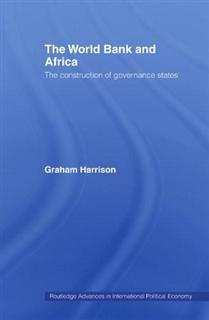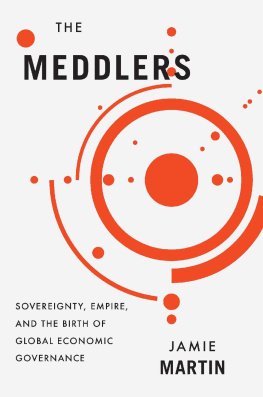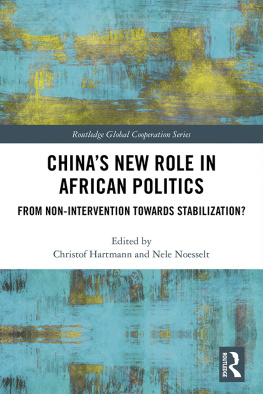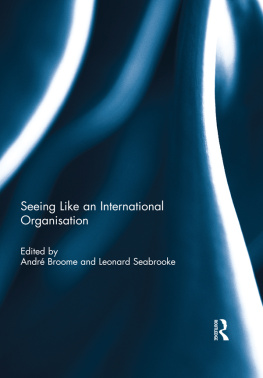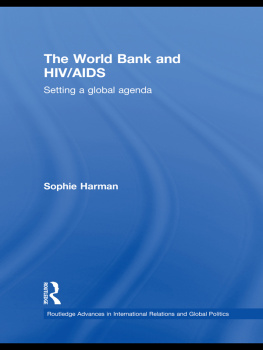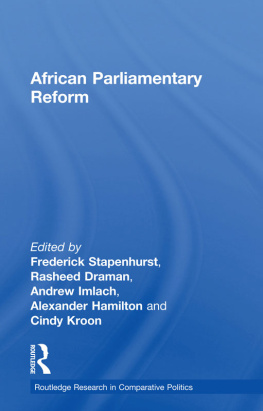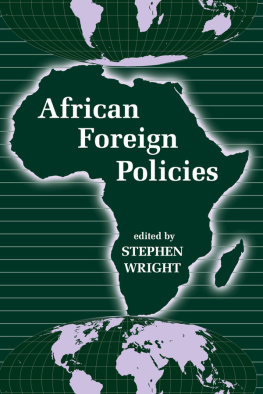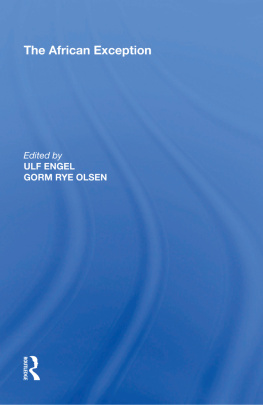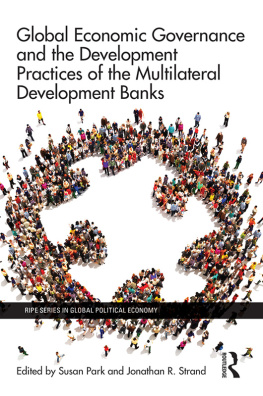The World Bank and Africa
The construction of governance states
Graham Harrison
R
Routledge
Taylor & Francis Group LONDON AND NEW YORK
First published 2004 by Routledge
11 New Fetter Lane, London EC4P 4EE
Simultaneously published in the USA and Canada by Routledge
29 West 35th Street, New York, NY 10001 Routledge is an imprint of the Taylor & Francis Group This edition published in the Taylor & Francis e-Library, 2004.
2004 Graham Harrison
All rights reserved. No part of this book may be reprinted or reproduced or utilised in any form or by any electronic, mechanical, or other means, now known or hereafter invented, including photocopying and recording, or in any information storage or retrieval system, without permission in writing from the publishers.
British Library Cataloguing in Publication Data A catalogue record for this book is available from the British Library
Library of Congress Cataloging in Publication Data Harrison, Graham, 1968-The World Bank and Africa : the construction of governance states / Graham Harrison. p. cm.
Includes bibliographical references and index.
1. World Bank. 2. AfricaEconomic policy. 3. AfricaPolitics and government1960- I. Title.
HG3881.5.W57H37 2004 338.91'096dc22
2003025313
ISBN 0-203-50064-4 Master e-book ISBN
ISBN 0-203-57300-5 (Adobe eReader Format) ISBN 0-415-30280-3 (Print Edition)
Contents
List of illustrations Acknowledgements List of abbreviations
x
xi
xii
PART I
The governance encounter: the World Bank, governance states and a new sovereign frontier
1 The road to governance: the World Bank and Africa
Introduction 3
The World Bank: foundations of an international institution Africa and the World Banks regional encounters 12 From first to second generation reform: a governance manifesto 18 Conclusion: governance states and the realm of governance 22
2 Governance states in Africa: conceptualising the encounter
between the World Bank and the sovereign frontier
Introduction 23 Beyond sovereignty 23 The history of governance states 26 Governance states: key features 39
3 Conceptualising the World Bank: governance and global
regimes
Introduction 43
The World Bank as liberalism in action 44 Liberalism and history 45
The World Bank as agent of capitalism 50 Marx without class? 52
Historicising the World Bank: international organisations and capitalist regimes 56 Embedding neoliberalism 64 Summary of Part I 67
PART II
Constructing governance states: institutions, discourse,
security
4 Introducing post-conditionality
Governance and post-conditionality 71 Post-conditionality in Uganda and Tanzania 74 The three faces of administrative reform in sub Saharan Africa 77
5 The mechanics of post-conditionality
New ministries 82
The post-conditionality state: donor/creditors 87 The contradictions of post-conditionality politics 91 Conclusion: evaluating post-conditionality administrative reform 97
6 Liberalism and the discourse of reform in governance states
Introduction 98
Administrative reform and liberal discourse 99 Administrative reform and liberal intervention 100 A vocabulary of liberal governance discourse 103 Politics without power? 108 Conclusion 115
7 Securing governance states
Introduction 117 The search for stability 118 Stability and risk 120 Governance reform as security 121
Stabilisation, state elites, and the importance ofpolitics 125 Conclusion 127
5 The mechanics of postconditionality
New ministries
What impact do administrative reform programmes have on the state, working as they do within a regime of post-conditionality? In the following sections, I will trace some of the salient features of the post-conditionality governance state in Uganda and Tanzania. This will involve less attention to the technical aspects of change, for example the extent to which a new personnel management system is working, and more attention to changes in political structures and processes. In the first section, we will look at the changing role of the two key ministries in respect to donor-funded administrative reform programmes: the Ministry of Finance and the Ministry of Public Service. In Uganda, these ministries are: the Ministry of Finance Planning and Economic Development (MoFPED) and the Ministry of Public Service (MPS) respectively; in Tanzania the ministries are: the Tanzanian Ministry of Finance (TMF) and the Civil Service Department (CSD) respectively.1
Ministry of Finance
The Ministry of Finance has become the hegemonic ministry within both countries. This is a key feature of the post-conditionality state because it relates directly to the ascendance of neoliberalism within the state; that is, the overall concern with supply-side economic management and the more effective raising of taxes. It was the Ministry of Finance that became the agent to reduce the amount of fungible money running through the sinews of the state, to reduce money supply, to increase interests rates, to reduce the budget deficit, and of course to arrange repayments on debt. In Tanzania in 1986, negotiations with the IMF were held in strict secrecy: even Ministers and the Central Committee of the ruling party were kept out of the loop. Instead, the Party gave its consent to the Ministry of Finance to come to an agreement with the IMF (Campbell and Stein 1992: 15).
But the Ministry of Finances power does not just derive from its centrality to structural adjustment. In the post-conditionality regime, it
remains the central institution. In the first place, it is the Ministry of Finance that serves as a conduit between the state and donor/creditors. In both Tanzania and Uganda, all agreements for project and programme funding are signed with the Permanent Secretary of the Ministry of Finance, regardless of the implementing Ministry. Ugandas MoFPED houses the Aid Liaison Unit, responsible for co-ordinating all donor funds:, all donor-funded projects - the only significant source of capital spending in the system - were managed centrally by the Ministry of Finance and Planning (Brett 1994: 68, 70). As a result, all donors, bilateral and multilateral, make real efforts to maintain good relations with the higher echelons of the Finance Ministries. This involves regular contacts with the ministry and a degree of information sharing not found in other parts of the state. It is also relevant to note that in Uganda the Ministry of Finance and the Ministry of Planning and Economic Development were merged in the key year of 1992,2 to create a super ministry principally concerned with the tasks of financial management rather than planning and development.
In Tanzania, the formal implementing partner for the Public Service Reform Programme (PSRP) is not actually the Civil Service Department -despite the fact that this is the institution that executes the programme - it is the Tanzanian Ministry of Finance (TMF) (interview, Economist , UNDP, July 2000). The Ministry of Finance took over the co-ordination of the Poverty Reduction Strategy Paper from the Vice Presidents Office, signifying this ministrys ascendance and centrality to the management of donor-state relations (Evans 2001: 1-2).
All bilateral donors negotiate their aid programmes with the Ministry of Finance, many referring to it as the point of entry, regardless of the nature of the aid programme. USAID in Tanzania shares early drafts of its programmes with the TMF (interview, Assistant Director, USAID, August 2000). The Ugandan USAID counterpart summarised the situation there by saying that when Tumusiime-Mutebile (then the Permanent Secretary and Secretary to the Treasury in MoFPED) was out of Kampala, all the donors panic because all of their projects go through him (interview, Democracy and Governance Advisor, USAID, July 2000). Thus, the Ministry of Finance maintains its paramount position as the conduit through which donors pump money into these two governments.
Next page
